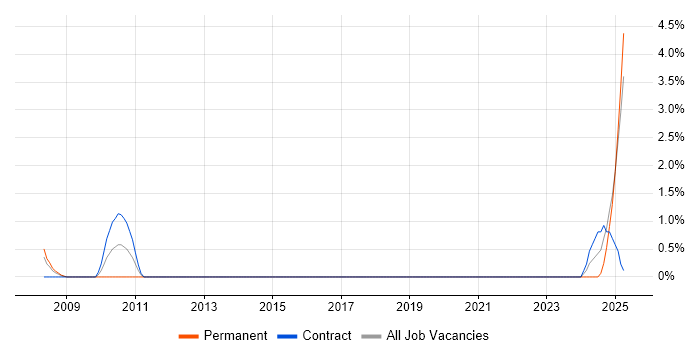Performance Metrics
Berkshire > Windsor
The table below provides summary statistics and salary benchmarking for jobs advertised in Windsor requiring Performance Metrics skills. It covers vacancies from the 6 months leading up to 21 September 2025, with comparisons to the same periods in the previous two years.
| 6 months to 21 Sep 2025 |
Same period 2024 | Same period 2023 | |
|---|---|---|---|
| Rank | 60 | - | - |
| Rank change year-on-year | - | - | - |
| Permanent jobs citing Performance Metrics | 8 | 0 | 0 |
| As % of all permanent jobs advertised in Windsor | 3.04% | - | - |
| As % of the Processes & Methodologies category | 3.10% | - | - |
| Number of salaries quoted | 1 | 0 | 0 |
| 10th Percentile | - | - | - |
| 25th Percentile | £105,000 | - | - |
| Median annual salary (50th Percentile) | £110,000 | - | - |
| 75th Percentile | £115,000 | - | - |
| 90th Percentile | - | - | - |
| Berkshire median annual salary | £52,500 | £117,500 | £52,920 |
| % change year-on-year | -55.32% | +122.03% | +17.60% |
All Process and Methodology Skills
Windsor
Performance Metrics falls under the Processes and Methodologies category. For comparison with the information above, the following table provides summary statistics for all permanent job vacancies requiring process or methodology skills in Windsor.
| Permanent vacancies with a requirement for process or methodology skills | 258 | 47 | 17 |
| As % of all permanent jobs advertised in Windsor | 98.10% | 100.00% | 94.44% |
| Number of salaries quoted | 13 | 16 | 11 |
| 10th Percentile | - | - | £32,500 |
| 25th Percentile | £28,250 | £35,000 | £35,125 |
| Median annual salary (50th Percentile) | £47,000 | £46,000 | £47,000 |
| Median % change year-on-year | +2.17% | -2.13% | -1.05% |
| 75th Percentile | £48,750 | £80,938 | £55,000 |
| 90th Percentile | £60,750 | £83,750 | £60,000 |
| Berkshire median annual salary | £49,000 | £60,000 | £55,000 |
| % change year-on-year | -18.33% | +9.09% | -8.33% |
Performance Metrics
Job Vacancy Trend in Windsor
Job postings citing Performance Metrics as a proportion of all IT jobs advertised in Windsor.

Performance Metrics
Co-occurring Skills and Capabilities in Windsor by Category
The follow tables expand on the table above by listing co-occurrences grouped by category. The same employment type, locality and period is covered with up to 20 co-occurrences shown in each of the following categories:
